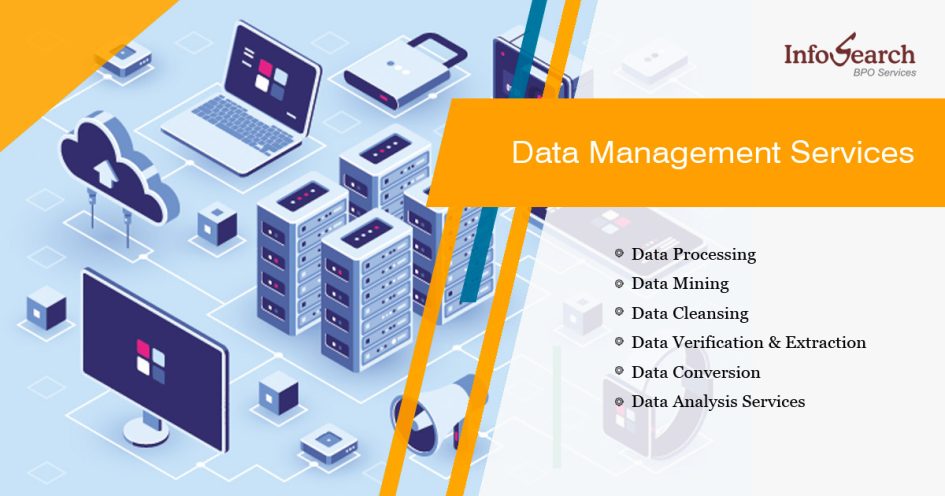Infosearch provides data management services including data processing, data cleansing, data analysis, data conversion, data verification & extraction and data mining services.
In the current world where information is viewed as a critical business asset, the management of tremendous volumes of data will determine the success of a firm. Data management outsourcing provides organizations with an effective approach to organization development, decision making, and organizational growth. Here’s, for your reference, a clearer picture of how outsourcing data services can change your business processes.
Overview of Data Management Outsourcing
Outsourcing of data management means engaging third party vendors with responsibilities involving processing, storage, protection and analysis of the data. These providers employ sophisticated tools and skills that cater for data credibility, retrievability and conformity to set standards.
Basic Advantages of Outsourcing Data Management
- Enhanced Efficiency and Productivity.
Outsourcing of data-related operations can help businesses minimize risks, automate processes, and avoid diversions.
- Cost Savings
Outsourcing annuls a long list of requirements and human capital, which cuts costs significantly.
- Need for Advanced Tools and Information
Advanced technology such as artificial intelligence, machine learning, and big data is used by providers hence high-quality services are delivered.
- Scalability and Flexibility
A third party can always be prepared to meet a company’s ever increasing data or the changes in business requirements.
- Improved Compliance and Security
Reputable suppliers make specific commitment to regulations such as GDPR, HIPAA or PCI-DSS that reduces risks linked to data leakage or lack of compliance.
- Data-Driven Decision Making
Hence, effective data management enables organizations obtain strategic information to support organizational decisions.
The Key Areas to Outsource Data Management
- Data Entry and Processing
This eases the task of dealing with large amounts of information, and guarantees quality and speed.
- Data Cleansing and Validation
Strengthens data quality by eliminating erroneous, redundant or inconsistent data.
- Database Management
This involves activities such as creating and updating databases, database tuning that enhances its usage.
- Data Analytics
Uses quantitative and qualitative data techniques to analyse both regular and complex data.
- Data Storage and Backup
All common and innovative methods of storage of important information is guaranteed, such as cloud storage.
- Data Migration
Ensures smooth migration of data between systems in order to reduce on time taken hence avoiding much disruption.
Innovation in Data Management Outsourcing Market
- AI-Driven Automation
Use of automation in the execution of routine processes, particularly data capturing and preparation accelerates work and also minimizes one’s chances of making mistakes.
- Cloud Integration
As cloud solutions and services clients understand that their data storage can be flexible, scalable, and accessed remotely.
- Real-Time Data Processing
Helps businesses to make real time decisions since it analyzes data in the same it is produced.
- Focus on Data Governance
Focus on/disclosure/disclosure and shareholder /stakeholder/commitment to increase auditing reliability and ensuring the company’s compliance with requirements of the law.
- Data Security Innovations
Upgrade to strong encryption, decentralization by using block chain solutions, and follow zero-trust policies to protect information.
Some of the challenges faced and how best to manage or eradicate them
- Data Security Risks
Solution: Choose providers who have passed certain security tests and audited frequently.
- Integration Complexities
Solution: It is also important to see that outsourced solutions have to be compatible with the current systems.
- Loss of Control
Solution: Hold detailed service-level agreements, report frequently, and have a transparent relationship with the provider.
- Geographical and Time Contiguity Barriers
Solution: Engage service providers, who are always willing to work around the clock or are from your cultural background.
Key things to do to effectively outsource data management
- Define Your Needs
Determine what precise data services your enterprise needs and what results you expect.
- Evaluate Providers
Please check this proposal for possible partners, with an emphasis placed on what kind of solutions they offer, how they work, their security practices, and what clients say about them.
- Establish Clear SLAs
Identified tangible targets in terms of accuracy of work, time duration and conformity to set regulatory codes.
- Monitor Performance
Periodically look at the numbers and have meetings to check that you are on the proper track in regards to your goals.
- Foster Collaboration
Always keep your outsourcing partner in your team, thus, sharing identical interests and maximizing communication.
Conclusion
Data management outsourcing transforms operational effectiveness, so organisations can maximise the potential of their data. It can be seen that with the help of specialized knowledge and the use of high technologies, business can optimize their operations, improve protection measures, and based on constant monitoring and trial and error, achieve qualitative improvements and development. Thereby, outsourcing remains a mandatory solution to stay competitive as data volume and their complexity increase gradually.








Recent Comments